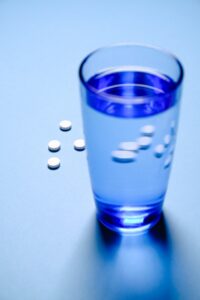When it comes to preventing cancer, aspirin might be the unexpected answer you’ve been searching for! Before we go any further, allow me to say that the science on this is good.
Following a study published in the Annals of Internal Medicine (all the way back in 1994), the researchers stated emphatically, “These results support laboratory, clinical, and other epidemiologic evidence that regular use of aspirin is associated with a decreased risk for colorectal cancer.”[i]
The New England Journal of Medicine published the results of a study examining female risk of colorectal cancer in 1995. They determined, “We found a decreased risk of colorectal cancer among women who took aspirin for 10 or more consecutive years. The full reduction in risk was seen at a level of four to six tablets per week, and higher doses had a similar apparent effect. Controlling for diet, alcohol intake, smoking, body-mass index, physical-activity level, and family history of colorectal cancer did not alter the results.”[ii]
In their 20-year follow-up of 5 aspirin trials published in The Lancet, researchers with Oxford University stated in their 2010 conclusion, “Aspirin taken for several years at doses of at least 75 mg daily reduced long-term incidence and mortality due to colorectal cancer. Benefit was greatest for cancers of the proximal colon, which are not otherwise prevented effectively by screening with sigmoidoscopy or colonoscopy.”[iii]
Another team with Oxford who reviewed more than 50 aspirin trials in 2011 (The Lancet) stated clearly in their results, “Allocation to aspirin reduced cancer deaths, particularly from 5 years onwards, resulting in fewer non-vascular deaths overall.” They continued, “Alongside the previously reported reduction by aspirin of the long-term risk of cancer death, the short-term reductions in cancer incidence and mortality and the decrease in risk of major extracranial bleeds with extended use, and their low case-fatality, add to the case for daily aspirin in prevention of cancer.”[iv]

A study published in 2011 showed taking aspirin (salicylic acid) significantly reduced the risk of colorectal cancer. 434 subjects taking just a placebo had an incidence of 30 cancers; 427 subjects taking aspirin daily for at least 2 years had an incidence of only 18 cancers. That’s a remarkable 40% reduction. No fancy expensive drugs can do that, or even come close!
In 2012, scientists with Harvard stated, “Both observational and randomized control trials support a chemo-preventive benefit of aspirin for colorectal cancer. Emerging data suggest that the anti-neoplastic benefit of aspirin may also be relevant to other cancer sites.”[v]
What is distressing is that there have been clear, scientifically proven, and repeatedly replicated results about the effect of aspirin on cancer for more than 20 years. And yet, I have never had a patient or colleague tell me that their conventional doctor recommended simple aspirin as an inexpensive and effective way to lower overall cancer risk.
It’s appalling.
Remarkable as it may seem, aspirin has a powerful effect on cancer cells. This is partially due to the fact that cancer is part of an overall picture caused by chronic inflammation and partially because aspirin has a specific cytotoxic property.
Alternative Aspirin on the Horizon
Aspirin has its’ problems. It can cause intestinal bleeding and ulceration. However, a “new aspirin” may be able to get around that problem. Here goes the science:
Your gut lining protects itself from damage by secreting nitric oxide (NO) and hydrogen sulfide (SH). Khosrow Kashfi at The City College of New York has developed “NOSH aspirin” – a variant that releases its own NO and SH, protecting the gut to some degree from the ravages of aspirin.[vi]
Kashfi’s team tested their NOSH aspirin against 11 human cell lines, including colon, breast, lung, prostate, and the deadly pancreas cancer. It was not only as good as aspirin alone: it was 100,000 more potent! With colon cancer, for example, it caused cancer cells to stop dividing, to wither and die.
Nobody knows yet why NOSH aspirin should have such potent anti-cancer properties but this research suggests a far lower (and therefore non-toxic dose of aspirin) would suffice while preserving your delicate gut lining.
As of fall, 2018 – NOSH aspirin is still in clinical trials. The wheels move painfully slow!
A Bit More Science
Another study was prompted because an analysis pooling results from existing randomized trials of daily aspirin (for heart and circulation benefits) found an estimated 37% reduction in cancer mortality among those using aspirin for 5 years or more.
So for this study, researchers pooled data from 100,139 predominantly elderly participants in the Cancer Prevention Study II Nutrition Cohort who reported using aspirin on questionnaires. The participants, who did not have cancer at the start of the study, were followed for up to 11 years.
The researchers found that daily aspirin use was associated with an estimated 16% lower overall risk for cancer mortality, both among people who reported taking aspirin daily for at least 5 years and among those who reported shorter-term daily use.[vii] [viii]
Part of the result was driven by a decrease of about 40% for cancers of the gastrointestinal tract (such as esophageal, stomach, and colorectal cancer) and a decrease of about 12% for cancers outside the gastrointestinal tract.
How Safe Is Aspirin?

The well-known dangers of taking aspirin haven’t gone away. Even low-dose aspirin can substantially increase the risk of serious gastrointestinal bleeding. Let’s hope the NOSH varieties hit the market soon (and they’re not snatched away by the pharmaceutical companies and out of reach for so many.)
Who would have thought that humble aspirin could be the answer to preventing and fighting cancer?
I’ll tell you who: lots of scientists and researchers for more than two decades!
To your good health,

Prof. Keith Scott-Mumby
The Official Alternative Doctor
REFERENCES
[i] Annals of Internal Medicine: Aspirin Use and the Risk for Colorectal Cancer and Adenoma in Male Health Professionals
[ii] The New England Journal of Medicine: Aspirin and the risk of colorectal cancer in women
[iii] The Lancet: Long-term effect of aspirin on colorectal cancer incidence and mortality: 20-year follow-up of five randomised trials
[iv] The Lancet: Short-term effects of daily aspirin on cancer incidence, mortality, and non-vascular death: analysis of the time course of risks and benefits in 51 randomised controlled trials.
[v] Harvard School of Public Health: Aspirin for the prevention of colorectal cancer
[vi] City University of New York: NOSH-Aspirin: A Novel Nitric Oxide–Hydrogen Sulfide-Releasing Hybrid: A New Class of Anti-inflammatory Pharmaceuticals
[vii] American Cancer Society: The American Cancer Society Cancer Prevention Study II Nutrition Cohort: rationale, study design, and baseline characteristics.
[viii] Journal of the National Cancer Institute: The Value of Helicobacter Eradication in Long-term Aspirin Users.
The post Time-Honored Aspirin for Cancer Prevention appeared first on Dr. Keith Scott-Mumby.
